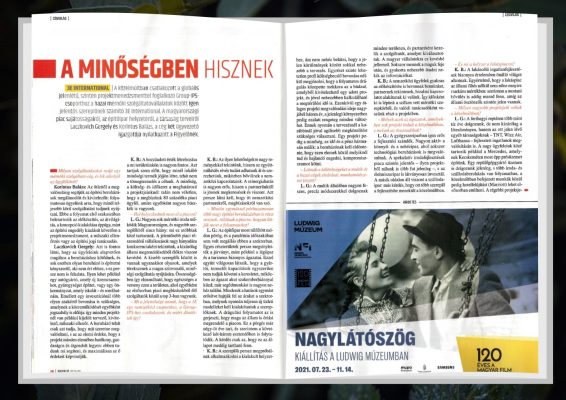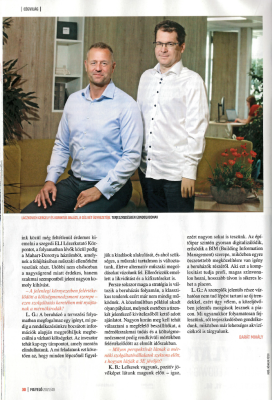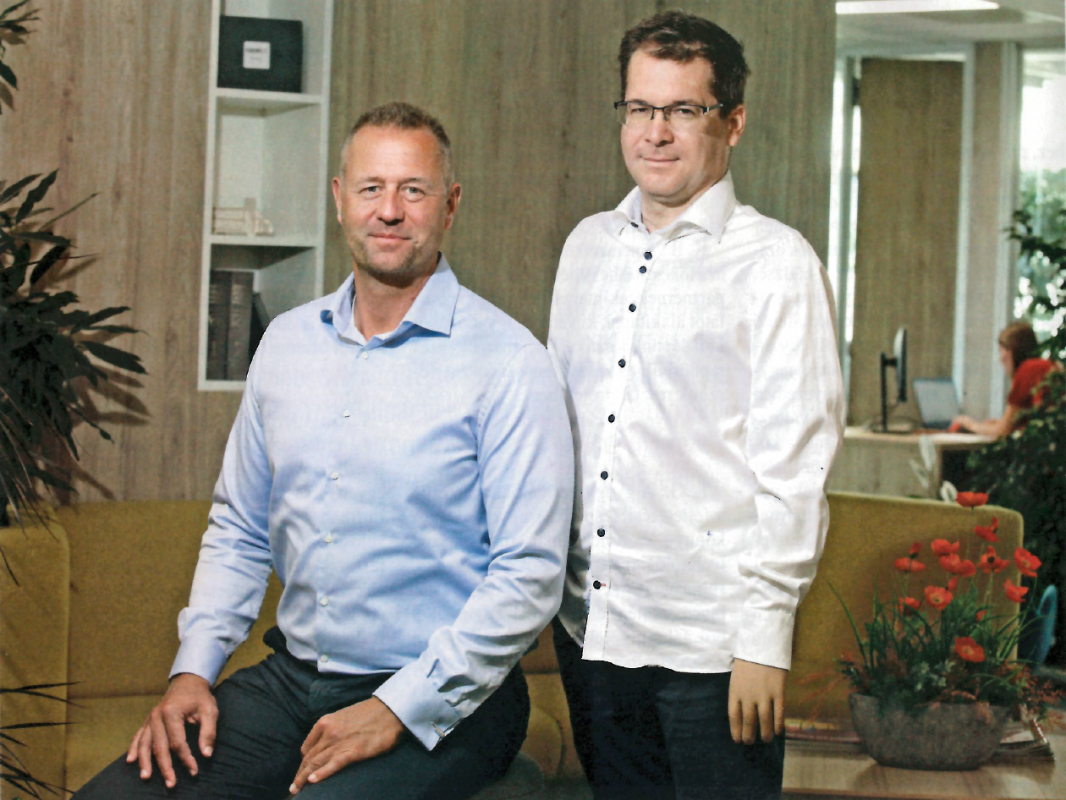One of Hungary’s major engineering service providers, 3E International, has recently joined Group-IPS, a global group also offering project management services. Managing Directors Gergely Laczkovich and Balázs Korintus told Figyelő (The Observer – a leading Hungarian business magazine) about the characteristics of the Hungarian market, the situation of the construction sector and the plans of the company.
– What services does an engineering service provider offer and who are its clients?
Balázs Korintus: We support construction projects from inception to completion, providing the most comprehensive services possible to those who come up with the idea and to contractors as well. In the first phase of the process there is preparation, screening and concept development, and, after a building permit is issued, we provide project management services, construction supervision and legal consultancy for construction projects.
Gergely Laczkovich: It is important to realise that our clients are mostly connected to the investment itself, and we often have clients who need to have a construction project but have no expertise in this area, and neither are they expected to, of course. For example a car manufacturer wants to have a new factory floor or plant built, or a municipality needs a new school building—I could go on and on. In addition, in investment projects several experts are needed and required by law: every project needs a designated planner, a constructor and a construction supervisor. Investors only know what they want to build, and it is in their best interest to have an effective, economically viable and well-designed project—this is where we come in and do everything we can to represent their interests.
B K: Creating added value is highly important in our field, too. Our priority is the quality of the product, we are not interested in mass production. Quality, budget and the timeline are key for our projects, no wonder 80% of our clients are from the private sector—and we are very proud of that.
– What is your current position on the market?
G L: Thee are many smaller engineering firms and quite a few larger ones in Hungary, we belong to the latter category. We consider most of the companies with a significant market share our competitors, but those that are only active on the public sector market, not so much. However, there are smaller operators, too, that strive to provide high quality services. All in all, we can say there is healthy competition in this field, and we are among the top 3 service providers that only work on private sector projects.
– Why did you choose to join Group-IPS, an international group, and what is the significance of this decision?
B K: We have high hopes about such opportunities, this cooperation makes two-way knowledge transfer possible, and we can extend our international network. There is great synergy, we can land new projects through our partner and vice versa. Of course these are international partners and projects.
– You have several large construction projects going on at the same time, so you have an overview of the market: what do you think about current trends?
 G L: The construction sector is roaring, and it didn’t stop during the pandemic, either. Of course there were some areas that were affected, like the aviation industry and parts of the tourism sector. Even with that, it is clear that production capacities cannot keep up with the demand, and there is a severe shortage of specialists in the sector; now it is difficult to find semi-skilled workers, too. All these keep pushing up prices in the sector, and as a result market operators need to develop brand new business models. The fact that the state is present on the market as a major client also contributes to the price increase. This bustling period started 4-5 years ago, and I expect it to go on for 2-3 more years. The question is how long these conditions can be sustained.
G L: The construction sector is roaring, and it didn’t stop during the pandemic, either. Of course there were some areas that were affected, like the aviation industry and parts of the tourism sector. Even with that, it is clear that production capacities cannot keep up with the demand, and there is a severe shortage of specialists in the sector; now it is difficult to find semi-skilled workers, too. All these keep pushing up prices in the sector, and as a result market operators need to develop brand new business models. The fact that the state is present on the market as a major client also contributes to the price increase. This bustling period started 4-5 years ago, and I expect it to go on for 2-3 more years. The question is how long these conditions can be sustained.
B K: Operators, of course, try to adapt to the new situation, but it is easy to see that planning is much more difficult under these circumstances. First, without a professional cost estimator it is close to impossible to predict what budget will be enough for a given project as prices keep going up, and it is much more difficult to calculate the payback period. Second, an average project takes about 3 years to complete, and in the current environment, a lot can change over such a period. This means that a much more agile approach is needed in planning than before. A project turns on the trinity of quality, time and money: investors must decide in which of these they can make a concession, make a compromise.
– Do you see differences between the expectations and work methods of Hungarian and multinational companies?
G L: Multinational companies usually have stringent and precise methods in every area, and consider the service provider they chose their partner. This is less common with Hungarian companies. They often go their own way and it is often more difficult to convey information to them.
B K: International partners often involve us in the preparatory phase already, they treat us as a partner and we have a relationship of trust. As a result, sometimes our role goes beyond that of the engineer and we become real consultants in the project.
– What are the sectors where a lot of projects have been launched recently, and what are the more cautious ones?
G L: In the pharmaceutical industry, there is a strong intention to develop. The light and heavy industries are very active, and these often have technological investment projects. The market of speculative office developments is also considerable – we have several such projects in progress – and there are significant investments in the food industry, too. At the other end of the spectrum you have the hotel industry; yet it is also true that several operators there have decided to invest recently, seeing it as an escape route.
– And what about the housing market?
B K: Residential property development is a world of its own, so to speak. It is clear that without government incentives driving it, the housing market would not be growing at this pace, and I believe this growth will last as long as these incentives are in place.
– What larger projects have you had recently?
G L: We have been working at the Liszt Ferenc International Airport for over 10 years, but not only on the facility, but on several properties developed by other companies there, e.g. TNT, Wizz Air, Lufthansa. Mercedes is one of our large corporate clients, we are currently building a press shop for them in Kecskemét. We are also working on an aircraft manufacturing plant, there are several office and hotel developments in progress, and we have recently completed a hotel reconstruction project (Marriott). I should also mention an earlier project, the ELI Laser Research Centre in Szeged, and a current one, the renovation of the Mahart-Dorottya block, where we are the construction supervisor. It’s not the size that makes this project significant, but the fact that it is a huge challenge professionally.
– In the current environment, the importance of cost management has increased – what is it and what services do engineering firms provide?
 G L: In the planning phase the investor identifies their needs and we give an estimate about the expected costs based on the available information. This is a reference point for the investor, something to start with. Our task afterwards is to monitor the costs at every step, change the technical content if necessary and provide alternative technical solutions. We also monitor liquidity and payments.
G L: In the planning phase the investor identifies their needs and we give an estimate about the expected costs based on the available information. This is a reference point for the investor, something to start with. Our task afterwards is to monitor the costs at every step, change the technical content if necessary and provide alternative technical solutions. We also monitor liquidity and payments.
Of course the strategy itself often changes over the course of a project, so conventional tenders do not always work anymore. For example, there was an invitation to tender recently where 2 of the 12 responding constructors submitted a bid. This means the suitable suppliers must be selected at a very early stage, and the importance of engineering expertise and cost management has significantly increased recently.
– What prospects do you think engineering service providers have and how do you see the future of 3E?
B K: We are enthusiastic, we have a positive vision of the future—and we take a lot of effort to make it come true. The construction sector is quickly going digital, too, BIM (Building Information Management) is becoming more and more prominent and investors require an increasingly complex approach. Those who can provide quality and this complexity in a professional manner can expect to be successful in the market in the long term.
G L: Most operators will probably not be able to keep up with new trends, so I expect major changes on the market in the near future. We, however, focus on continued development, we are planning to expand and there are ongoing negotiations about potential acquisitions.
MIHÁLY BARÁT

